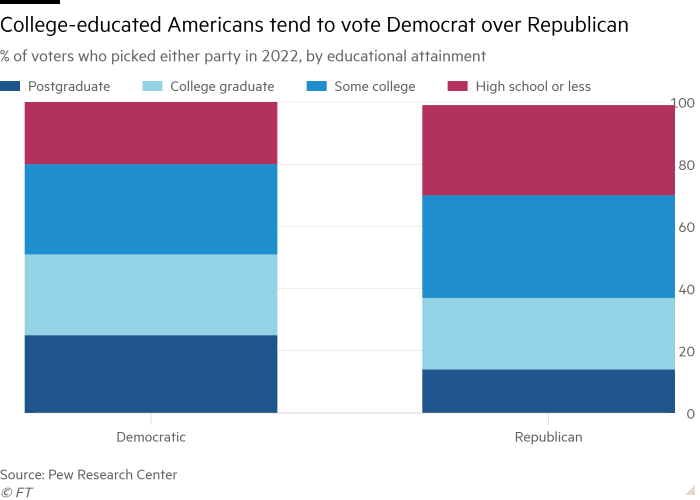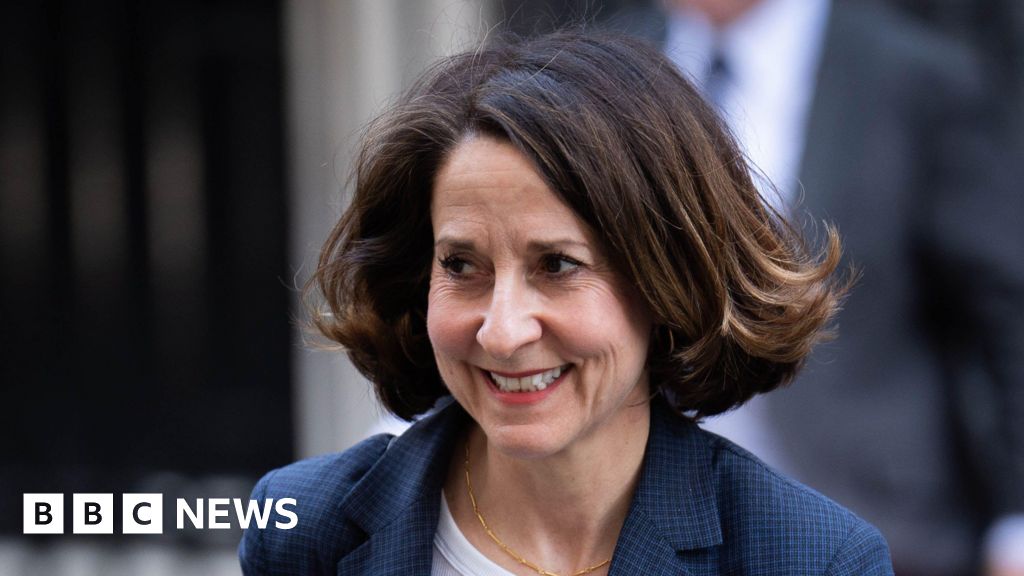Critics of America’s elite universities have been quick to declare that the departure of Harvard University president Claudine Gay last week was just an early victory in a very long campaign.
Gay’s resignation followed criticism of her handling of antisemitism on campus and claims of plagiarism. But her shortlived tenure as the first female black leader of the US’s oldest university has also fed into the country’s broader “culture wars” against higher education.
Christopher Rufo, the conservative activist who helped spark the campaign against her, wrote in the Wall Street Journal: “Gay was a scholar of not much distinction who climbed the ladder of diversity politics, built a [diversity, equity and inclusion] empire as a Harvard dean, and catered to the worst instincts of leftwing ideologues on campus . . . While her resignation is a victory, it is only the beginning.”
Alan Garber, Gay’s interim successor, and the Harvard Corporation, which oversees the university, must rebuild links with faculty, students, alumni, donors and politicians at a time of intense scrutiny over governance, affirmative action, freedom of speech and campus protests that could threaten Harvard’s future applications and revenues.
As Bill Ackman, the billionaire hedge fund manager and a Harvard graduate who has led attacks on that university and others, wrote on X: “There is a lot more work to be done to fix Harvard than just replacing its president.” On Sunday he pledged to launch an AI-powered review of whether leading US academics had plagiarised others’ work, after a Business Insider report raised plagiarism questions about his wife, Neri Oxman.
But Harvard, founded in 1636, is a particularly tempting target because of its research prowess, vast $51bn endowment and the disproportionate influence of its graduates, which include many of those now on the attack.
Ryan Enos, a professor of government at Harvard who helped co-ordinate a call from more than 700 faculty to defend Gay and academic freedom, said of her critics: “They smell blood in the water and will test to see if this is an issue they can lean into. They have seen some success and will try to use it as a hammer in the upcoming [US presidential] elections.”
The current crisis began in the aftermath of Hamas’s attacks on Israel on October 7, when more than 30 Harvard student associations posted a joint statement arguing Israel was “entirely responsible for all unfolding violence”.
Some high-profile donors criticised the university for not more openly condemning Hamas and clamping down on antisemitism. Meanwhile, some students and faculty said it failed to prevent “doxxing” or public identification of the students while pro-Palestinian arguments were being suppressed.
The pressure on Gay intensified after her awkward congressional testimony in which she called for “context” in judging how to respond to chants interpreted as calls for Jewish genocide. Critics then began alleging plagiarism in her academic work, and she was subjected to racist hate mail and death threats.
Her departure and Garber’s appointment may offer some respite. He is a white Jewish man with strong academic credentials and experience as a senior administrator, who said Harvard’s initial statements after October 7 were inadequate.
“It’s an inspired choice,” said Frederick Lawrence, the former president of Brandeis University, who argued that higher education had not been under such attack since the McCarthy era of the 1950s. “Alan is an academic of the first rank. He’ll be an outstanding leader during this time as they weather the storm.”
Enos, who is seeking an early meeting with Garber on behalf of university faculty to “heal the campus”, said there were concerns about the influence of diversity in appointments and insufficient breadth of political views. But he said “their portrayal by the right is a gross exaggeration” and there was a need for greater freedom of speech including for pro-Palestinian views.
Alongside recent threats by some donors to withdraw funding from Harvard, it has reported a drop in the number of applications for early admissions for entry in 2024 compared with last year, although above pre-pandemic levels.
Jamie Beaton, head of Crimson Education, a college applications consultancy, argued that the university’s prestige meant any short-term decline in demand “will quickly rebound as candidates take advantage of the momentary easing in acceptance rates”.
In the months ahead, critics will watch how Harvard interprets the Supreme Court’s decision last summer to outlaw affirmative action in admissions, and the outcome of an investigation by the Department of Education into allegations of antisemitism and Islamophobia.
Future hurdles include scrutiny of race-linked financial aid for applicants; and of teaching at a time when conservative states including Florida have shaken up governance of public colleges, challenged tenure and curricula, and squeezed funding for diversity programmes.
Lynn Pasquerella, head of the American Association of Colleges and Universities, said: “There’s a risk of even greater destabilisation ahead. We’re already seeing attempts to remove tax-exempt status and federal funds from colleges that don’t have a particular point of view. It’s about legislative over-reach and bullying by high-profile donors.”
She argued that the shifting pressures on presidents helped explain the shrinking longevity of their mandates to an average of less than six years. “Those coming in are least prepared, and are eyeing the door already.”
A recent survey by Deloitte’s Center for Higher Education Excellence showed that most presidents considered strategy, communication and fundraising to be their most important roles, with crisis management an important consideration while far less time was being spent on student engagement.
Marjorie Hass, the former head of Rhodes College who now runs the Council of Independent Colleges, pointed to the magnifying effect of social media. “Many of the scandals with foreshortened tenure were linked to saying something which in the context of the conversation made sense, but sounded very different when communicated with everyone online,” she said.
The political right shows no signs of stepping back from its attacks on higher education, while the levels of trust in academia have dropped and the political polarisation between those with and those without university qualifications is ever greater.

Even for Americans less concerned about any perceived ideological stranglehold on campuses, there is a concern among middle-class voters about the rising costs of education, the competitiveness of access to elite institutions and the job prospects of graduates.
Larry Ladd, a university governance consultant and former Harvard administrator, suggested that despite the recent turmoil, there would be plenty of candidates to take over from Garber. But he added: “It will be hard for Harvard to recruit women and people of colour just because of the experience Claudine Gay had.”
Despite the populist attacks on higher education, Lawrence argued that top institutions led by Harvard would remain strong. “Ask the critics where they themselves were at college and where their children went,” he said. “The answers will often suggest a rather disturbing level of hypocrisy.”
Credit: Source link










